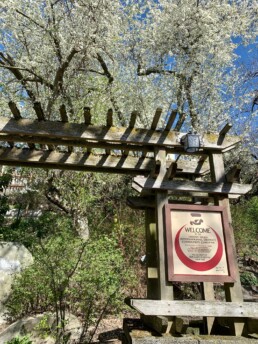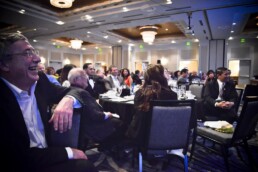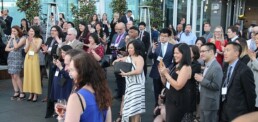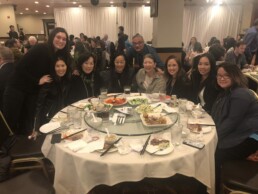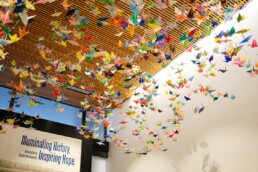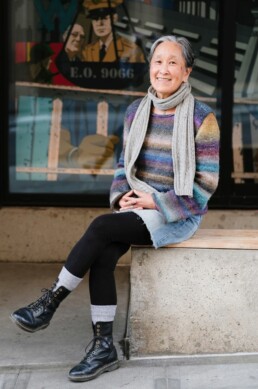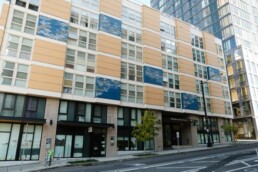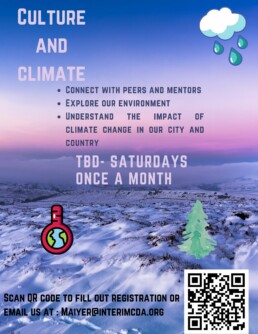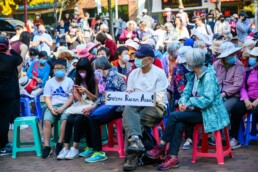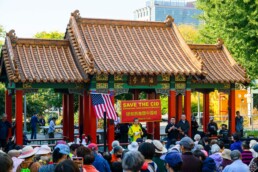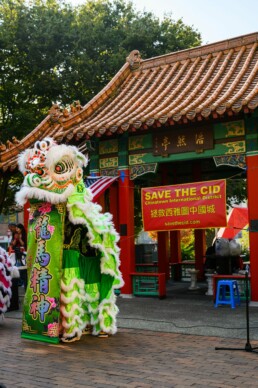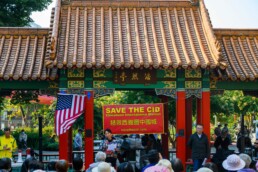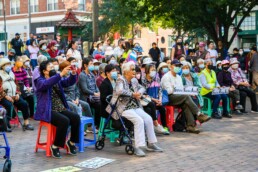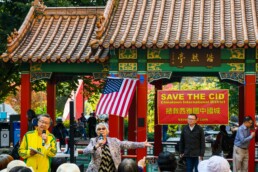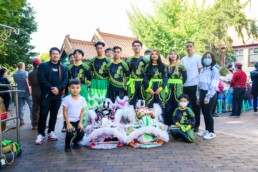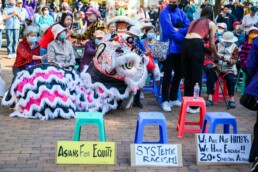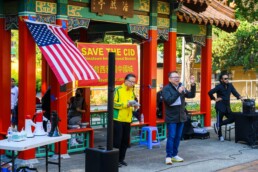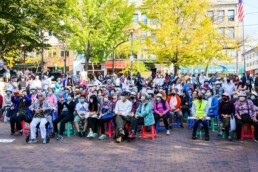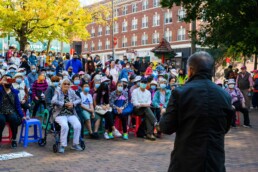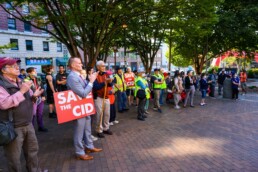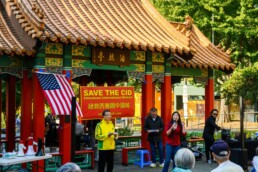Department of Neighborhoods Food Equity Fund grants InterIm CDA Danny Woo Garden and WILD $100,000
July 3, 2023Danny Woo Garden,Community,News,WILD,Press
Department of Neighborhoods Food Equity Fund grants InterIm CDA Danny Woo Garden and WILD $100,000
Seattle – The City of Seattle Department of Neighborhoods (DON) has awarded the Danny Woo Garden in Chinatown-International District (CID) and the Wilderness Inner-City Leadership program $100,000 through the Food Equity Fund to support intergenerational learning programs and infrastructure upgrades and repairs that will support community needs in the garden. The Food Equity Fund is a DON program whose purpose is to invest in community-led work that contributes to an equitable and sustainable local food system.
Specifically, this funding will support operations in the Danny Woo Garden in the following ways:
- Provide equitable and culturally specific food sources in the Danny Woo Garden for low-income, immigrant, refugee, Asian, and Pacific Islander elders in the CID;
- Provide intergenerational information sharing and learning between elders and API youth about food systems, food justice, and food security through the garden to maintain cultural and ethnic food traditions;
- Provide funds for infrastructure repairs to maintain sustainable food systems in the garden.
The Danny Woo Garden was created through community activism in 1975 and since then has been a vital source of food security and of maintaining culturally appropriate sources of food for low-income, immigrant, refugee, Asian, and Pacific Islander elders in the CID. Currently, 66 elderly residents utilize close to 100 plots in the 1.5-acre community garden. Over the years, the Danny Woo Garden has fed hundreds of elders. It has also improved their physical and mental health by providing space to be physically and socially active.
Funding will support programs that bring elders and youth together to learn about seed-to-plate practices, culturally specific recipes based on what gardeners have grown, the physical health value of maintaining a healthy diet of ethnic produce, and more. InterIm CDA’s youth program, Wilderness Inner-city Leadership Development (WILD), engages 40-100 low-income API teens ages 14-19 in year-round programming, and the Danny Woo Garden provides a live outdoor classroom for WILD programming that supports two tenets of WILD youth programming: Building intergenerational relationships between API immigrant elders and youth; and learning the value of an organic, culturally relevant garden’s place in a low-income BIPOC community food system.
Time spent together in the garden among elders and youth creates conversations and experiential information-sharing among generations around concepts of food justice in low-income immigrant and refugee populated communities. Youth gain a holistic understanding of how critical it is for underserved, immigrant communities and individuals to grow what they eat and have access to healthy, organic, culturally relevant, sustainably grown produce.
“Our vision for food equity and sustainability is to honor what our CID community of immigrants and refugees has given up when they’ve left their home countries, usually out of necessity, by giving them space to hold onto their cultural food practices,” said Pradeepta Upadhyay, Executive Director of InterIm CDA. “We also want to ensure this knowledge is passed down to younger generations. We want these culturally unique ties to the land and growing practices to continue here in the CID. This is why we’ve created infrastructure in the garden to support a learning environment for youth.”
Funding will also support much needed infrastructure repairs and ongoing maintenance in the culturally and ethnically responsive garden including for the pig roast pit, chicken coop, one toolshed, the outdoor cookery, maintaining a seed library to offer free seeds to the CID community and garden visitors, cisterns, a boardwalk that allows access to the garden plots, flower beds, and fences and handrails necessary for safety of the elders.
“The garden gave the land back to the old folks who left it in the old country to strike it rich here. They never realized how much they missed the earth,” wrote Bob Santos in his memoir, Humbows Not Hotdogs, about seeing how the creation of the Danny Woo Garden gave back to the elders in the CID and how much they’ve used the garden. This funding helps support this legacy in the CID.
For more information on all awardees, see the DON press release.
Contact: jwasberg@interimcda.org
47th Annual Pig Roast Volunteer Recruitment
June 6, 2023Events,Danny Woo Garden,Community,News,Press

47th Annual Pig Roast: July 21 and 22
Summertime’s in the air – and in the CID! Which means the pig roast is coming up! Join us on July 21 and 22 for the 47th annual pig roast. Volunteer registration for the pig roast is now live; see shifts here. We roast the pig all night long Friday into Saturday morning will be in need of help all 24 hours. Contact volunteer@interimcda.org for more information. And come one come all for the Friday community gathering with food and drinks and enjoying the garden. We can’t wait to see you and catch up with you all!
Special thanks to Enterprise Community Housing for their support of the pig roast!
Connecting with Community Dinner
March 29, 2023Events,Community
Join InterIm CDA for an evening to connect with our community. Please come share a delicious multi-course meal with new and old friends hearing stories of activism in the CID
Hi, friends! Well, it’s been a while (three years!), but the time has finally come for us to get together in person, share food together and be with one another. We can’t wait to see you. InterIm CDA’s annual community dinner is a chance for us to catch up, learn about Uncle Bob’s Place and other things InterIm CDA has been doing and to celebrate our strong history of activism in the community. We’ll keep the stage program short and the social time long since we know we’ve all got a lot of catching up to do with one another!
Joyale Seafood Restaurant: 900 S Jackson St, Seattle, WA 98104
Date: Friday, November 3, 2023
Time: 5:00 PM
Tickets: $100 (check back for ticket sales link later this spring)
RSVP by October 16, 2023 to Lynette Seigafo at lseigafo@interimcda.org
Coalition of CID partners celebrates approval of north and south stations as preferred alternative, reducing risk of community displacement
March 24, 2023Community,News,Neighborhood,Press

PRESS RELEASE For immediate release
Thursday, March 23, 2023
PRESS CONTACTS:
Christina Shimizu, Executive Director, Puget Sound Sage, 206-552-5508, chrissy@pugetsoundsage.org
Derek Lum, Advocacy and Policy Manager, InterImCDA, dlum@interimcda.org
Nina Wallace, CID Coalition, 360-305-0160, cidnohotel@gmail.com
Coalition of CID partners celebrates approval of north and south stations as preferred alternative, reducing risk of community displacement
WHAT: The Sound Transit board has approved the north and south stations for the West Seattle and Ballard Link Extensions (WSBLE) project that Coalition of CID partners have advocated for.
Chinatown International District, Seattle, King County –
After a long and difficult fight to choose a preferred alternative, the Chinatown International District (CID) Coalition, Puget Sound Sage and InterImCDA are celebrating a major victory for securing the future growth and development of the CID neighborhood to be equitable, affordable, and a sustainable place for immigrants and working class communities of color to live and thrive for generations to come.
The coalition’s fight for a station location is rooted in the vision to maximize opportunity for equitable transit-oriented development, provide great transit options, stop the acceleration of gentrification, and for the survival of a community that has struggled for decades from racist policies and land grabbing encroachment. This decision is a critical step in acknowledging and repairing past harms.
“We extend our sincere appreciation to the Sound Transit board and staff, including Mayor Harrell, Executive Constantine and Council President Juarez for supporting north and south. We want to especially thank Councilmember Tammy Morales, for hearing our voices and concerns and being a vocal advocate against displacement and for inclusive transit oriented development,” said Christina Shimizu, Executive Director of Puget Sound Sage. “We are grateful for their willingness to listen and recognize the importance of our long-standing history and the need for access to regionally connected transit, affordable housing, and opportunities for culturally relevant equitable transit oriented development (eTOD) that do not accelerate gentrification pressures in the neighborhood.”
The CID Coalition, InterIm CDA, and Puget Sound Sage are committed to fighting speculative corporate development and displacement, and to ensuring that communities of color are centered in decision-making around transit and land use. “Good planning means something different for different communities,” Shimizu added. “A truly equitable and inclusive urbanism, and density done right, requires policymakers to listen to communities of color and trust that we know what is best for our neighborhoods.”
“InterIm CDA has been a community based organization serving the needs of the CID for 53 years,” said InterIm CDA Executive Director Pradeepta Upadhyay. “We endorsed the north and south station locations option after weighing the significant impacts on the CID and its property owners, businesses, community organizations, and residents. Based on our values, we believe this is the best option for the community. We thank the Sound Transit board for making the right choice, and look forward to working with the community and Sound Transit to make these options the best they can be for the CID.”
While the CID Coalition, Puget Sound Sage and InterIm CDA are celebrating this victory, they are also aware that their work is not done. The coalition plans to stay engaged and organized to ensure that the community benefits the most from the station: pedestrian improvements for walking and rolling, lighting, and wayfinding among other community benefits and mitigation connected to the light rail line as well as righting past harms. They will also advocate for a platform to connect Sounder to the South of CID station, expanded greenspace and protections for City Hall park, and access to culturally relevant, community based eTOD to provide much-needed affordable housing for the neighborhood.
“This win is only one step to repairing the harm and distrust in our communities, and the destruction that previous infrastructure projects have wrought on the CID,” said Monyee Chau of the CID Coalition. “The copious amount of labor that organizers have put in to protect our neighborhood is a testament to how deeply we all care for this community, and I have so much gratitude for everyone who helped us fight for this win. May we continue to make these conversations more accessible and inclusive of all the people that they affect, and move forward with collaboration and a commitment to ensuring that the Chinatown International District community remains a vibrant and thriving part of Seattle.”
About the CID Coalition:
The Chinatown International District Coalition is a grassroots, multiracial, multiethnic and multigenerational organization that works to promote social, economic, and environmental justice for low-income communities of color in the CID and Greater Seattle. They fight against displacement, gentrification, and the erasure of community history and culture.
About Puget Sound Sage:
Puget Sound Sage charts a path to a living economy in the South Salish Sea and Duwamish River Valley (greater Seattle) regions by developing community power to influence, lead, and govern. We ground our policies in grassroots organizing & community-based research with people directly impacted by systems of oppression and organizations serving BIPOC workers, their families and communities. Through the power of grassroots organizing, policy and advocacy strategies, and leveraging the influence of coalitions centering impacted communities, we have organized for and passed some of our region’s most exciting policies that promote climate justice, good jobs and equitable development in low-wage and people of color communities. Our campaigns and theory of change are rooted in intersectional economic & racial justice, which for us means organizing historically disenfranchised people and bringing them together to build power as a vehicle for social change.
About InterIm CDA:
InterIm CDA was created in 1969 and is a nonprofit affordable housing and community development organization based in Seattle’s Chinatown/International District (CID). Since 1969 InterIm CDA (ICDA) provides multilingual, culturally competent housing and community building services to those disenfranchised due to lack of English, low acculturation and poverty. Though historically ICDA’s focus was on the API community living in the CID, they currently serve about 5,000 unduplicated low-income limited English speaking individuals from Asia, Africa and America throughout the greater Puget Sound.
###
Seedling giveaway for the community today March 23 at Danny Woo Garden
Hope you can join us today for our community seed giveaway! Spring is here! See you at the Danny Woo Garden today at 1.

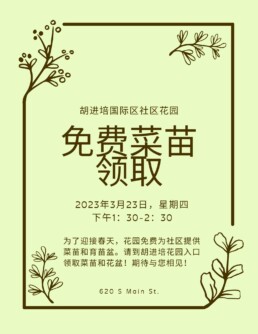
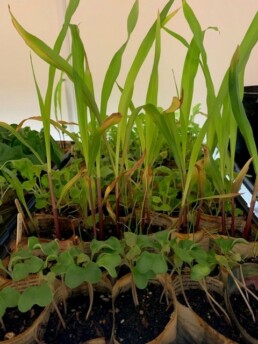
WILD Spring 2023: REGISTER NOW!
March 16, 2023Community,News,WILD,Neighborhood
WILD Spring 2023 quarter is now open for registration!
Know a teen who wants to connect with their API culture and people in the CID, build their leadership skills, learn about environmental and food justice and earn a stipend or school service hours while doing so? Contact Malika Aiyer, InterIm WILD program manager to learn about the upcoming spring quarter and how to register to participate! Contact: maiyer@interimcda.org. Learn more about WILD on our website. [https://interimcda.org/wild/]. Get more details on spring quarter activities (arts projects, environmental justice/climate change, seed-to-plate activities in the Danny Woo Garden, adulting) in the flyers below:





InterIm CDA Statement for Light Rail
InterIm CDA statement of support for North and South station locations for light rail expansion
Sound Transit has proposed four options for a new light rail station to serve Chinatown-International District (CID). No matter the option, there will be massive impacts on the neighborhood affecting businesses, residents and all who utilize, visit, work and live in the CID. The options include the following:
1. A station on 4th avenue south near Union Station
2. A station on 4th avenue near the King County administration building “North Station”
3. A station on 6th avenue south near the INS building “South Station”
4. A combination of both options #2 and #3 “North and South options”
InterIm CDA statement of support for North and South station locations for light rail expansion
ATTN: Julie Timm
401 S Jackson Street
Seattle, WA 98104
Dear CEO Timm, Board Chair Constantine, and other leaders,
Sound Transit is currently working on a proposal that will significantly impact our CID community for 100 years. We were appalled by the way in which both the original 4th and 5th avenue options did not adequately address the displacement pressures in our community that will be generated over time from the new light rail line. Significant amounts of displacement pressures are inherent to light rail expansions. These options added to the burden through significant traffic disruptions, road closures, and dust from construction impacts. In the case of 4th Ave. South, roughly 9 to 11 years of impacts will surely harm property owners, businesses, community organizations, and residents. Some people will be displaced from the community because of these construction impacts. Our values lead us to write our DEIS letter with a focus on physical, economic, and cultural displacement, along with other concerns for the health, safety, and well-being of the community members we serve. When the North and South station options were revealed, we were intrigued based on our values and the topics above.
We saw the potential for these new station locations to remove damage to the CID compared to the 4th avenue station location. The potential TOD development opportunities could also help push back against displacement pressures in the area and possibly provide affordable housing in a community where many are either living in lower quality housing or simply locked out of the opportunity to live near the CID due to cost. However, we still had questions for Sound Transit staff about various details of these options and the process overall. After our discussion with Sound Transit staff, we have come to this conclusion.
InterIm CDA supports the Sound Transit board in choosing the North and South station locations to serve our CID community. We are making this choice because, based on our values, we believe this is the best option for the community.
· This combination maintains regional connectivity to all three Sound Transit lines, allowing CID community members to utilize the 1, 2, or 3 lines.
· This combination keeps the stations accessible to and serving the CID, providing access to light rail for community members.
· This combination makes construction duration significantly shorter with significantly less potential impact due to distance. This will harm fewer residents, businesses, property owners, and community organizations and help reduce one specific avenue for displacement.
· This combination allows for a significant opportunity for equitable transit-oriented development and open space, benefits direly needed that could be utilized by the CID community.
These options have the potential to reduce significant harm to CID. In combination with the equitable transit-oriented development opportunities, these new options significantly impact addressing displacement in the CID related to this project.
This does not eliminate our overall concern about physical, economic, and cultural displacement related to any light rail project in proximity to the CID or in addressing past harms committed to the community. Many other details still need to be addressed to make these stations optimal for the community. Sound transit must act on the fact that it is working in a community at high risk for displacement and its own racial equity commitments. We still believe that even if the North and South station locations are chosen, there still needs to be a strong mitigation and community benefits discussion which, amongst other items, implements a Community Based Affordable Housing and Affordable Commercial Space Framework.
We look forward to the next phase of the West Seattle to Ballard Link Extension project and are proud of the community for making its voice heard. Sound Transit must reduce harm while still providing transit benefits. Regardless of the station location chosen, we will continue to work with the community and Sound Transit, along with other government stakeholders, to produce the best outcome for the community.
InterIm CDA
Enterprise Article
February 23, 2023Events,Community,News,Hirabayashi Place,Neighborhood
Building community resilience through placemaking! Enterprise recently showcased InterIm CDA’s real estate development director Leslie Morishita and a few of our buildings in the CID including Hirabayashi Place and Uncle Bob’s Place: “Housing is fundamental,” Morishita said, “but we also want to take every opportunity to serve this community. We include a focus on art to lift the history and culture of the place and engage the community that’s here.” Check our the full article! Photos by Channing Johnson Photography.
WILD Program
November 16, 2022Events,Community,News,WILD,Neighborhood
WILD has an after-school program focused on environmental, social justice, community, and leadership building.
Community-driven victory in the CID
October 18, 2022Events,Community,News,Neighborhood,Press
On Saturday, Oct. 15 hundreds gathered in Hing Hay Park to celebrate King County’s announcement the day before that they would not be expanding services at the Salvation Army-operated shelter in SODO.
King County and Seattle opened the shelter two years ago without a word to the community or any kind of engagement or outreach. The community then recently learned the county was planning to expand it into a 5-block, low barrier 500-person ‘mega shelter’ with an RV parking lot, tiny house village, sobering center, and acute behavioral crisis center. Again, there had been no outreach the CID neighborhood about the expansion.
This became an issue of systemic racism the Chinatown-International District has faced time and time again. From I-5 splitting the neighborhood in half, to the construction of the Kingdome to neglect regarding public safety issues (why are the lights still off in the InterIm CDA parking lot under the freeway, Seattle City Light?), this was yet another example of, as InterIm’s statement to Seattle City and Council and King County Council said, “an intentional ploy to keep the poorest people of color down, to concentrate them in one small area away from whiter more affluent areas, and to pit them against each other.”
Initial community notification was started by Tanya Woo, Gary Lee, and Julie Neilson after they learned about it in a Public Safety Council meeting. Tanya then took the lead on uniting the community to push back against the expansion. Elders in the CID joined their efforts and marched in protest and testified at City of Seattle and King County Council Meetings to make their voices and concerns heard. InterIm CDA was the first of several agencies who publicly approved of the pushback and provided financial support of their efforts.
Activists planned a protest and rally to take place in Hing Hay Park on Saturday, Oct. 15. But before they could hold it, on Friday, Oct. 14, King County Executive Dow Constantine announced the expansion project was canceled due to our united efforts. What started as a protest turned into a celebration of community activism, community pride, and a reflection of those past and present who have continued to advocate for and protect the CID.
Photos by Randy Wo-Eng
